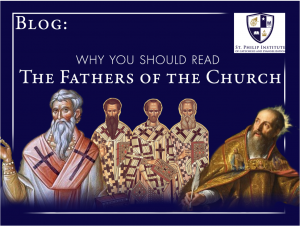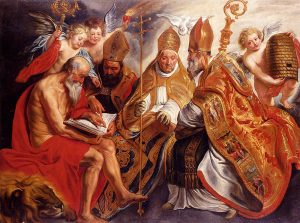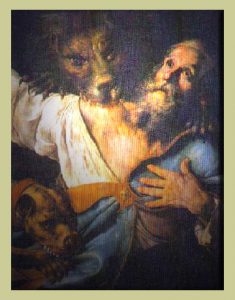Written by Dr. David Tamisiea from St. Philip Institute. It is a nice introduction to the Fathers of the Church – the guys that made me Catholic. For the whole article, click here.
*******************************

-
Save
St. Paul, for example, claims to be a spiritual father to those who receive the Gospel through his ministry: “I do not write this to make you ashamed, but to admonish you as my beloved children. For though you have countless guides in Christ, you do not have many fathers. For I became your father in Christ Jesus through the Gospel” (1 Cor 4:14–15). St. Irenaeus (c. 125 – 202 ad), a Church Father himself, explains the idea of spiritual fatherhood in his famous work Against the Heresies: “For when any person has been taught from the mouth of another, he is termed the son of him who instructs him, and the latter [is called] his father” (IV, 41, 2).
There are literally hundreds of Church Fathers whose writings could easily fill up an entire library all by themselves. The Fathers are generally divided into two major groups: The Greek or Eastern Church Fathers, and the Latin or Western Church Fathers. The Greek or Eastern Church Fathers are those outstanding Christian authors who lived in the Eastern part of the ancient Christian world. Most of these men wrote in Greek, although there are some Eastern Fathers who wrote in Syriac, in Coptic, or in Armenian.
The most significant Eastern Fathers are St. Irenaeus, St. Clement of Alexandria, St. Athanasius, St. John Chrysostom, and the three Cappadocian Fathers, St. Basil the Great, St. Gregory Nazianzen, and St. Gregory of Nyssa.

-
Save
There are three really good reasons for why you should read the Church Fathers. First, there is tremendous value in reading works written by authors who lived at a time and in a place other than our own. The great Christian author C.S. Lewis, in his introduction to the Church Father St. Athanasius’ great work, On the Incarnation, recommends that everyone regularly read some of “the old books” to balance the reading of modern works. As Lewis explains, every age is especially good at seeing certain truths, and each has its characteristic blindness that prevents it from seeing its own errors and faults.
“The only palliative,” he says, “is to keep the clean sea breeze of the centuries blowing through our minds, and this can be done only by reading old books.” When we read “the old books,” we can receive the knowledge and wisdom of earlier ages that enable us both to grasp forgotten truths and better recognize the errors of our time. Lewis suggests that a good rule of thumb is that, after reading a contemporary book, never allow yourself to read another one until you have read an “old book” in between. But this rule about reading “the old books” extends beyond the Church Fathers to all the great books of earlier ages. So why read the Church Fathers in particular?
The second and more specific, reason you should read the Church Fathers is to become better equipped to defend your Catholic faith from its detractors. As Catholics, we have a serious obligation to know our faith, to share it with others, and, when necessary, to defend it against distortions, misrepresentations, and other forms of attack: “Always be prepared to make a defense to anyone who calls you to account for the hope that is in you” (1 Pet 3:15).
Do you want to show a friend that the Catholic Mass is in essence the very same form of worship practiced by the early Christians? Read and then share with your friend St. Justin Martyr’s account in his First Apologia (c. 155 ad) sent to the Roman Emperor Antoninus Pius, explaining how Christians actually worship by celebrating the Mass (I, 65–67).

-
Save
If that does not convince, then read and share St. Irenaeus of Lyons’ work Against the Heresies, where he stresses that Christian orthodoxy depends upon union with the Church of Rome, “It is a matter of necessity that every Church should agree with this Church, on account of its preeminent authority” (III. 3).

-
Save
While it is true that Catholic doctrines on the papacy, Eucharist, devotion to the Blessed Virgin Mary and the saints, Sacred Tradition, infant Baptism, the necessity of faith and works, and the like, are not found in the full developed form of later ages, the essential elements of each of these is present from the very beginning, just awaiting the Church’s deeper insight, fuller understanding, and further development.

-
Save
The third reason for reading the Church Fathers is probably the most important of all: to deepen and enrich your faith. The Church Fathers, together with the Apostles, are rightly considered the “Founding Fathers” of the Church, who helped to lay the foundations of Christianity at the very beginning by teaching, explaining, defending, and spreading the saving truths of the Gospel. I recall when I began in earnest to read the Church Fathers in graduate school, it was as if a whole new world was being opened up to me: the same will hold true for you as well.
By reading the Fathers, you will most certainly become a much better informed, knowledgeable, and faithful Catholic. St. John Paul II explains why the Church Fathers are so important to the faith of the Church: “The Church still lives today by the life received from her Fathers and on the foundation erected by her first builders she is still being built today in the joy and sorrow of her journeying and daily toil. … Guided by these certainties, the Church never tires of returning to their writings – full of wisdom and incapable of growing old – and of constantly renewing their memory” (Patres Ecclesiae 1).



This Post Has 3 Comments
Another excellent article. However, neither of the links to the complete article at the St. Philip Institute work. Unfortunately, a search of the St. Philip Institute web site did not reveal the article.
I received a reply to an inquiry to the St Philip Institute with an updated link Here’s the article on their site: https://www.stphilipinstitute.org/essays/why-you-should-read-the-early-church-fathers
Your text covers most of the article anyway but in case you want the update here it is.
I'm having a discussion (okay, an argument) with somebody in a comment section online. He claims that the Catholic Church didn't exist until the 4th century. I suggested that he read the early Church Fathers, since he would see from that not only that the Catholic Church existed from the time Jesus founded Her but that the religious practices of the early Church were Catholic, not Protestant.
His reply: The early Church Fathers mostly taught heresy.
Also, verses from the Bible do not mean what the Church says they mean; they mean what *he* says they mean, because he has proved Scripturally that he has the authority to interpret Scripture (and yet somehow the Church doesn't, and certainly I don't because I just accept the Church's teaching).
It bears a remarkable resemblance to trying to hold a discussion with a cardboard box – an arrogant, smug cardboard box.
STEVE RAY HERE: I agree completely. There are some people that just are not worthy of an intelligent discussion. Jesus said not to throw your pearls before swine and this is exactly what he meant.
I’ve had a rule that I’ve applied for the last 10 years or so. You can get a pretty good idea of who is honest and who isn’t. I will invest a lot of time in an honest person and I won’t waste a second on a fool.
There’s only one exception to that rule, and that’s if there is a lot of other people in on the conversation that would learn from it and see the stupidity of one side and the truth on the other side.
Here is my article Unanimous Consent of the Fathers: https://www.catholicconvert.com/documents/UnanimousConsent.doc
Comments are closed.